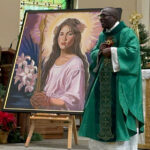By Mary Lu Callahan
As the new school year gets under way, there may be many heated debates around what is appropriate to teach about the history of slavery and racial injustice in America. Emotions run high on this subject, which has led me to reflect on my own education starting in the 1960s.
I am the product of 16 years of Catholic education, most of it local. I received a fine education but believe there were some holes in that education, especially from a Christian perspective. In classes on American history, the lengthy era of chattel slavery was covered but in a benign, “just the facts” manner. I don’t remember hearing it directly expressed that owning another human being was sinful.
I am sure many Catholic Messenger readers have seen the movie “The Ten Commandments” and know that story as an important part of our faith heritage. Who was the bad guy in that movie? The enslaving and memorably portrayed Pharaoh. We all rooted for the Israelites in their God-protected escape. Many readers may also remember the movie “Spartacus,” also based on an historical person. I am sure no one rooted for the Roman officials in that movie but rather for the slave revolt. We instinctively understand in our hearts that people deserve to be free. No one argues both sides as in, “Well Pharaoh did need labor to build those pyramids so he had a point.” How did we develop such a blind spot in assessing our own country’s past? We must ask ourselves whether it was easier to identify with enslaved people portrayed by actors who looked white.
When the mini-series “Roots” premiered on TV, it was a wake-up moment for many Americans to the heart-breaking pain inflicted on the families of enslaved Black people. Many of us had not fully considered that before, nor its impact on succeeding generations. I also had not learned about the Jim Crow laws enacted in many states after the Civil War that extended discrimination and exclusion of Black people. How did we become so numb, even within our faith communities, to this injustice?
Our fellow Black Catholics continued to experience pain, long after abolishment of slavery. The legendary coach John Thompson described in his memoir “I Came As a Shadow” that as a child in his Maryland parish the Black parishioners received Communion only after all the white parishioners had received. Why was that acceptable?
The aftereffects of our history of slavery can be so close as to be uncomfortable. We may have beloved family members, dead or living, who embraced racist attitudes and language. How do we live in that tension? What do we say to our children or grandchildren? We should pray for the softening of hearts of those who still hold such attitudes but also make it clear that we cannot agree, which may not be easy.
Many Black Catholic men and women are speaking out today to help us understand what we need to do so that they experience full inclusion in a Church they love but has not always loved them back. They can help us see how discrimination continues as a byproduct of our history’s tentacles reaching into housing, healthcare, employment, policing and the Church. We must be awake to our calling as Catholic Christians. The truth does not need to be hidden or unspoken. Exposing it to the light will encourage cleansing. Christ, be our light.











